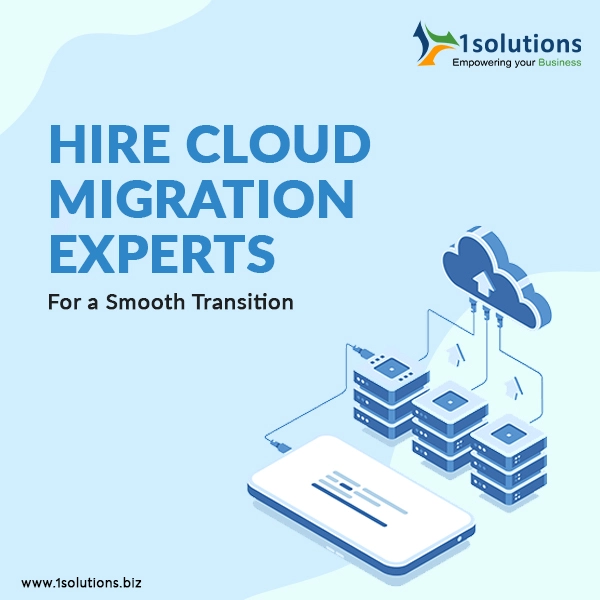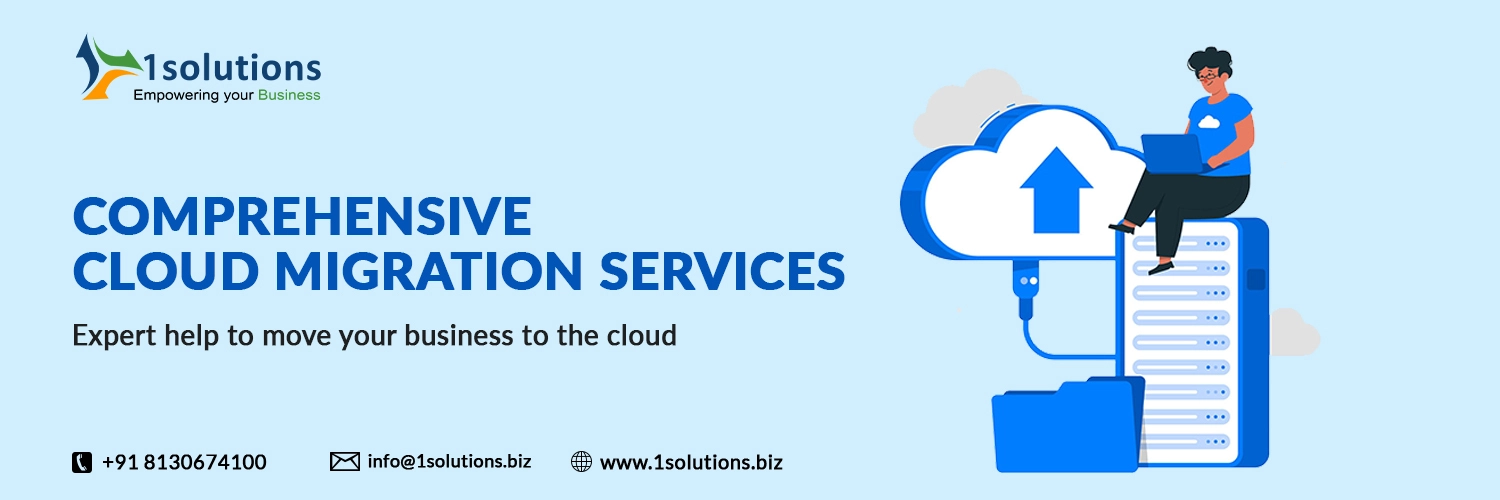
- Digital MarketingSEO ServicesSocial Media
- Design & Branding
- Web/Application DevelopmentEcommerceApp DevelopmentWebsite DevelopmentDedicated Hire
- About Us
Comprehensive Cloud Migration Services
Move to the cloud up to 5x faster with a comprehensive migration framework that ensures rapid compliance through built-in security and governance controls.
At 1Solutions, we empower enterprises to modernize and optimize their IT environments through seamless, secure, and scalable cloud migration services. Whether you’re rehosting legacy applications, replatforming core systems, or fully refactoring your workloads, we ensure minimal disruption and maximum business impact.
End‑to‑End Cloud Migration Framework
- Cloud Strategy & Planning
- Lift-and-Shift Rehosting
- Replatforming
- Refactoring & Modernization
- Data Migration
- Post-Migration Optimization
At 1Solutions, we offer end-to-end cloud migration services designed to help businesses move to the cloud with confidence and control. We begin with a detailed assessment of your current infrastructure, applications, and dependencies to understand technical requirements, compliance considerations, and business objectives. Based on these insights, we build a custom migration roadmap tailored to your needs, whether rehosting, replatforming, or refactoring.
Our migration engineers use trusted, enterprise-grade tools like AWS Application Migration Service, Azure Migrate, and Google Cloud Migrate to ensure data and workloads are securely transferred with minimal downtime. During the process, we modernize applications where appropriate by introducing containerization, managed services, and scalable architectures that improve performance and reliability.
Post migration, we focus on continuous optimization. This includes implementing Infrastructure as Code (IaC), cost control through FinOps, and setting up CI/CD pipelines for faster releases. With multi-cloud expertise across AWS, Azure, and GCP, 1Solutions ensures your cloud environment is secure, agile, and future ready.
Satisfaction Rate
Project Delivery
Operational Costs
experience
Our Cloud Migration Services Offerings
01.
Cloud Readiness
Assessment
- We analyze your existing IT setup to assess cloud suitability, uncover risks, and build a clear migration roadmap with ROI and TCO insights.
02.
Cloud Strategy
& Planning
- Based on assessment findings, we craft a cloud strategy aligned with your business goals, covering architecture, phases, security, and compliance.
03.
Application
& Data Migration
- We securely migrate apps and data using automation, starting with pilot runs to minimize downtime and ensure smooth scaling across workloads.
04.
Cloud Infrastructure
Modernization
- Post-migration, we modernize with cloud-native tools like Kubernetes and IaC to boost scalability, automation, and development speed.
05.
Multi-Cloud
& Hybrid Deployments
- We implement flexible, vendor-neutral solutions across AWS, Azure & GCP, combining cloud and on-prem for performance, cost, and compliance.
06.
Post-Migration
Optimization
- We fine-tune your cloud setup for cost and performance, offering ongoing monitoring, FinOps, support, backups, and proactive governance.
Why Hire 1Solutions for Cloud Migration?
1Solutions delivers enterprise-grade cloud migration with speed, security, and measurable ROI. Our certified experts bring deep multi-cloud knowledge across AWS, Azure, and GCP, backed by strategic partnerships with leading providers.
Certified Multi-Cloud Experts
Our engineers are certified across AWS, Azure, and Google Cloud, demonstrating deep expertise in architecting and managing workloads across diverse platforms. These credentials ensure your migration is guided by professionals trained in the latest cloud best practices.
Strategic Cloud Partnerships
As a recognized partner of major cloud providers, 1Solutions benefits from direct access to exclusive tools, training, and resources. These partnerships allow us to accelerate project timelines, ensure seamless integration, and stay current with evolving cloud technologies.
Proven Enterprise Track Record
We have successfully delivered cloud migration solutions for enterprises across finance, healthcare, manufacturing, and tech. Our work consistently results in measurable outcomes; such as significant infrastructure cost savings, enhanced application performance, and faster time-to-value.
Security-First Mindset
Security is at the core of our migration process. We implement encryption, identity and access management, and compliance-aligned configurations to meet standards like HIPAA, PCI, and GDPR. Our security team performs rigorous audits and proactively mitigates risks at every step.
Client-Centric Approach
We work as an extension of your team, aligning our engagement model to your operations. With dedicated project managers, agile delivery cycles, and clear communication, we ensure transparency and adaptability throughout the migration journey.
Comprehensive Support
Post-migration, we provide full support and hands-on training to ensure your teams can manage and scale the new cloud environment confidently. Our managed services team is available to monitor, maintain, and optimize your infrastructure so you can focus on innovation and growth.
What Our Clients Say




- Disha Narang
(Imagine)


Their team is always available when needed, offering the right solutions at the right time. This commitment to service quality is why we have trusted them for several years and continue to recommend them to others with full confidence, knowing they will be in capable hands.
Wishing the entire 1Solutions team continued success!

I am happy with your service, it is exceptional, designing is just great. I am impressed. I advise to all friends to avail your services.
Thank you,
Acharya Praveen Chauhan











Why Cloud Migration Matters for Business Growth
Cloud platforms offer on-demand scalability, allowing businesses to quickly expand or reduce resources as needed. This elastic capacity helps manage seasonal traffic spikes or rapid growth without overprovisioning or investing in new hardware. You only pay for what you use, improving both agility and cost-efficiency.
Cloud migration enables a flexible IT environment where workloads can run in public, private, or hybrid cloud setups. Multi-cloud strategies also allow organizations to choose the best platform for each workload while avoiding vendor lock-in. This flexibility makes it easier to adopt emerging technologies and future-proof operations.
Leading cloud providers offer enterprise-grade security capabilities, including data encryption, identity and access management, automated patching, and real-time threat detection. Migrating to the cloud enables businesses to standardize security practices across systems and maintain a consistent, controlled security posture.
Cloud adoption transforms capital expenses into predictable operational costs. You can eliminate the need for physical servers, maintenance, and energy costs while leveraging cost-saving tools like auto-scaling, reserved instances, and resource optimization. Many organizations experience significant savings within months of migrating.
Major cloud environments are built to meet stringent industry regulations and offer certifications such as HIPAA, PCI DSS, and ISO 27001. By migrating to the cloud, organizations can more easily meet compliance standards with built-in auditing, logging, and policy enforcement tools.
The cloud accelerates innovation by enabling rapid provisioning, automated deployments, and faster development cycles. Teams can spin up test environments in minutes, deploy updates continuously, and respond faster to market demands. This agility boosts competitiveness and shortens time-to-market for new products and services.
Typical Agency

Generic Strategy

Limited Flexibility

Communication Barriers

Higher Cost Structure

Standard Reporting


Customized Strategic Approach

Cost-Effective Expertise

Comprehensive Skill Ecosystem

Advanced Technology Integration

Transparent, Results-Driven Partnership
In House Team

High Recruitment Costs

Limited Expertise Range

Technology Investment

Scalability Issues

Narrow Perspective

Cloud migration is the process of moving digital assets including data, applications, and IT infrastructure from on-premises environments to the cloud. At 1Solutions, our Cloud Migration Services are built to help businesses shift seamlessly to public, private, or hybrid cloud platforms such as AWS, Microsoft Azure, and Google Cloud. This transition supports cost efficiency, scalability, and improved performance.
The migration process begins with a readiness assessment, where we evaluate your existing IT landscape, application dependencies, and business goals. This helps determine what workloads should move, when, and how. The result is a strategic roadmap that prioritizes business continuity and long-term value.
We then select the most suitable migration approach: rehosting (lift and shift), replatforming (minor modifications), or refactoring (complete modernization). Each method is chosen based on the complexity of your systems and the level of transformation required.
Using automated migration tools and industry best practices, we execute the data and application transfer while minimizing downtime. We ensure security, integrity, and compliance are maintained throughout the migration process. Applications may be modernized during migration using containers or cloud-native services.
After migration, our team focuses on optimizing your cloud environment. We fine-tune performance, implement Infrastructure as Code, and introduce CI/CD pipelines to support DevOps practices. We also use FinOps to help you control costs and scale resources efficiently.
Whether you are looking to move legacy systems, modernize applications, or adopt a hybrid model, 1Solutions delivers full-spectrum support. Our goal is not just to move you to the cloud, but to help you innovate and grow in it.
Trusted by 100+ Clients Globally | ROI Driven Work









What is Cloud Migration?
Cloud migration is the process of moving applications, data, and workloads from on-premises infrastructure to a public, private, or hybrid cloud. It is more than just transferring servers. Migration involves rethinking application architecture, data transfer, networking, security, and operations.
A typical cloud migration service starts with discovery: identifying applications, dependencies, and business requirements. Each workload is then mapped to the right destination, whether that’s IaaS, PaaS, or SaaS.
Organizations can choose from several approaches such as rehosting, replatforming, or refactoring. Each option balances speed, cost, and modernization needs. Migration projects also include testing, rollback plans, and performance monitoring.
Enterprises often rely on professional services to ensure minimal disruption during the move. These services coordinate between application owners, security teams, and finance to deliver a smooth transition.
When done effectively, migration unlocks DevOps practices, automation, and continuous optimization. The result is a cloud environment that is scalable, resilient, and future-ready.
Companies adopt cloud migration for speed, flexibility, and cost efficiency. Cloud resources can be provisioned in minutes, supporting rapid innovation and faster time-to-market. Businesses also gain access to advanced tools such as AI, machine learning, and analytics that would be difficult to build on-premises.
Cost reduction is another key driver. Pay-as-you-go pricing helps avoid heavy capital expenses, while improved utilization lowers total cost of ownership. Studies show that simple migrations can cut costs by 20–40 percent. More advanced refactoring projects often deliver significant gains in productivity and application performance.
Resilience and reliability are equally important. Cloud providers offer high availability, disaster recovery options, and global infrastructure. This reduces downtime and ensures a consistent customer experience.
Many organizations use a cloud migration service to capture these benefits faster. With expert planning and execution, businesses can avoid disruption and achieve quicker returns on their investment.
Enterprises typically use three main migration strategies.
- Lift and Shift (Rehost): This moves applications as-is into the cloud without code changes. It is fast and low-risk but often requires optimization later.
- Re-platforming: Also known as “lift, tinker, and shift,” this involves small modifications. For example, switching from a self-managed database to a managed cloud database. It offers efficiency gains without requiring a full rewrite.
- Refactoring: This is the most advanced approach. Applications are redesigned for cloud-native architectures using microservices, containers, or serverless. It requires more effort but delivers maximum scalability and agility.
A skilled cloud migration service usually applies a mix of these strategies. Workloads are grouped into migration waves to ensure business continuity. Choosing the right approach depends on business priorities, timelines, and long-term goals.
The market offers a wide range of cloud migration services and tools. Leading cloud providers offer their own solutions. AWS provides Application Migration Service (MGN). Microsoft offers Azure Migrate. Google Cloud includes Migrate for Compute Engine.
Third-party platforms like VMware HCX, CloudEndure, and Terraform are also widely used. These help with multi-cloud environments, complex dependency mapping, and infrastructure automation.
A professional migration service combines these tools with expert planning and execution. This includes pre-migration workshops, security assessments, dependency mapping, test runs, and performance optimization after cutover.
By using the right tools, businesses reduce manual work, minimize errors, and achieve faster migration timelines. Structured processes also provide smoother cutovers with less downtime, giving organizations confidence as they transition to the cloud.
Despite the benefits, cloud migration has risks. Cost overruns are common when workloads are not properly sized or when hidden expenses like data transfer are overlooked.
Security and compliance gaps may appear if controls are not correctly replicated. Application dependencies can cause outages if not mapped in advance. Data-heavy workloads also present challenges, as moving large volumes can be slow and expensive.
Another challenge is the skills gap. Cloud operations require new expertise in automation, DevOps, and cost governance. Without proper training, organizations may face delays or errors.
A structured cloud migration service helps mitigate these risks. Dependency mapping, cost modeling, security baselines, and rollback options are built into the process. Testing and phased cutovers also reduce downtime. Enterprises that follow these best practices experience up to 80 percent fewer disruptions compared to poorly planned migrations.
Cloud adoption continues to grow rapidly. IDC reported that global spending on public cloud services reached around $805 billion in 2024 and is projected to nearly double by 2028.
Surveys show that more than half of enterprise workloads are now running in public clouds. Multi-cloud adoption is also on the rise, with AWS, Microsoft Azure, and Google Cloud holding the majority of market share. Many enterprises run workloads across two or more providers to avoid lock-in and optimize for performance and cost.
The increasing use of AI and analytics is also fueling migration. Businesses are investing in cloud infrastructure that supports data processing, machine learning, and advanced insights.
These trends highlight why cloud migration services are so important. With IT budgets shifting toward the cloud, expert guidance and structured frameworks are essential for organizations to modernize effectively.
Completing a migration is only the first step. The real value comes from measuring how workloads perform in the new cloud environment. Businesses need clear KPIs to track cost savings, performance improvements, and operational agility.
Typical success metrics include:
- Cost efficiency: Comparing pre-migration infrastructure spending against new cloud costs, adjusted for growth in workloads.
- Performance gains: Monitoring application response times, uptime, and disaster recovery metrics. Many companies see a reduction in downtime by 60 to 80 percent after a well-executed migration.
- Agility: Measuring deployment frequency, developer productivity, and time-to-market for new features.
- Security and compliance: Verifying that data protection, access control, and regulatory requirements are equal or stronger than before.
Cloud migration services often provide post-migration optimization support. This includes continuous monitoring, automated scaling, and FinOps (financial operations) practices that keep costs under control. By tracking results, organizations can demonstrate ROI to stakeholders and make ongoing improvements.
Measuring success ensures that migration is not just about moving workloads, but about creating long-term business value. It helps IT and business leaders validate their decisions and build a roadmap for continuous cloud modernization.
The future of cloud migration is continuous rather than one-time. Enterprises are adopting a “cloud operating model,” where workloads are regularly optimized and modernized.
Automation and AI will play a larger role in the process. Advanced tools will handle discovery, dependency mapping, and optimization with little manual input. Industry-specific migration templates will speed up adoption in sectors like finance, healthcare, and manufacturing.
Hybrid and edge computing will also shape the next phase. Workloads will increasingly be distributed across on-premises, cloud, and edge environments, requiring flexible migration services.
The rise of AI workloads will further increase demand for cloud-native infrastructure such as GPU clusters and high-performance storage. Organizations that adopt continuous migration practices will stay ahead by creating new products, gaining real-time insights, and operating with greater resilience.
A modern cloud migration service will therefore act as the backbone of digital transformation, helping businesses stay agile and competitive in the years ahead.
Frequently
Asked Questions
Frequently asked questions (FAQs) about our cloud migration Services.
Cloud migration is the process of moving digital assets such as data, applications, and IT infrastructure from on-premises or legacy systems to cloud environments like AWS, Azure, or Google Cloud. It helps businesses improve scalability, performance, and operational agility.
The duration of a cloud migration depends on the complexity and size of the workloads, the chosen strategy (rehosting, replatforming, or refactoring), and organizational readiness. Most enterprise migrations take anywhere from a few weeks to several months.
Downtime can be minimized or even avoided with proper planning and the use of automated migration tools. At 1Solutions, we follow a phased approach and leverage staging environments to ensure business continuity throughout the migration process.
Yes, cloud migration can be highly secure when performed with best practices. We use encryption, access control, and compliance frameworks to ensure your data is protected during transit and at rest. Cloud providers also offer advanced security features by default.
Yes, cloud native development benefits a wide range of industries including finance, healthcare, retail, logistics, and SaaS. Its flexibility and scalability make it ideal for businesses looking to modernize legacy systems and embrace digital transformation.
Cloud migration costs vary based on factors such as the number of workloads, complexity of applications, licensing, required tools, and post-migration support. While there may be upfront costs, businesses often see significant long-term savings through reduced infrastructure and operational expenses.
Yes, we offer continuous post-migration support including cloud environment monitoring, cost optimization, performance tuning, patch management, and security audits to ensure long-term success and ROI.
Services
Company
© 1Solutions | All Rights Reserved | Made with ![]() in India
in India



















